#character: li mu zi
Text



Lost in The Stars (2022) | If you really want to change, I'm willing to give you a second chance.
#i was fantasizing this is about multiple personality disorder lol#turns out it's much simpler#lost in the stars#cmovie#zhu yilong#character: he fei#huang zi qi#character: li mu zi#aesthetics
12 notes
·
View notes
Photo




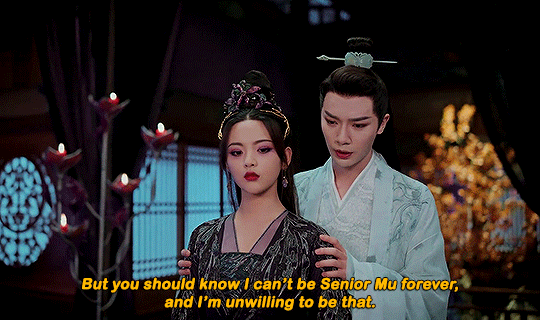

The Journey of Chong Zi (2023)
#the journey of chong zi#yang chaoyue#li daikun#chong zi#cdramaedit#chongzi#cdrama#chongzi spoilers#*#*tjoc#the editing/pacing of this show is its biggest downfall which is a shame#because i actually like a lot of the characters#like senior mu! I LOVE HIM#AND I'M LOSING MY MIND OVER THESE TWO#he changed his appearance! he held her hand all night so she could sleep!#im also ignoring what i read about the finale. I PRETEND I DO NOT SEE IT#im pretty sure the target audience for this set is just me haha BUT I LOVE THEM
100 notes
·
View notes
Text

“Global Examination” by Mu Su Li. Manhua is from Bilibili; English translation is available for free - read it here!
#global examination#mu su li#official art#e zi#you huo#qin jiu#mike#shu xue#yu wen#old yu#character id needed
1 note
·
View note
Text
15 DAY BL CHALLENGE - DAY 3
Side Dish(es) That Should Have Been The Main Course

This one is hard for me because I have a few!
First thought is Jack/Zhao Zi, but I love the main couple in History 3: Trapped too. HOWEVER, I definitely watched a video that cuts together just Jack/Zhao Zi's plot multiple times...was gonna link it, but I can't find it anymore. ( ;A; ) Anyway, I just love how smoll and innocent Zhao Zi is and Jack is just like "I've only had Zhao Zi for a day and a half..."
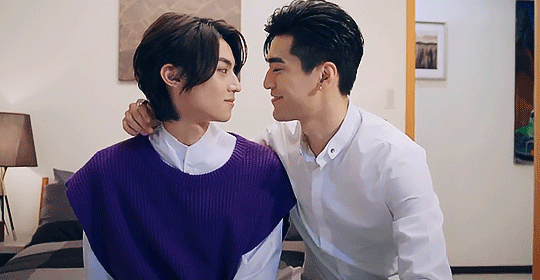
Staying in Taiwan bl dramaland, my second thought is Li Chen and Mu Ren from History 4: Closer to you. I will admit...this story had two main couples, so Li Chen and Mu Ren might not count as a side dish. HOWEVER, I would straight up CUT the other couple completely or alter their backstory beyond recognition. The younger brother character creeps me the fuck out and makes the show nearly unwatchable to me. Li Chen and Mu Ren redeem it because I fucking love their love and their figuring out their relationship together...but it's so hard to watch the other couple's plot play out. I skip when I rewatch ngl.

My final, and probably most valid thought, is Nuer and Syn from Cutie Pie. Like...I know we got to see this actor couple again Middle Man's, but I found their personalities absolutely grating in that show (especially poor Yim's character my GOD). I would love to see a series explore Syn's monkhood vs the obvious sexual tension with Tutor more. We got a little bit in the second season...BUT I WANT MORE.

UPDATE: HOW DID I FORGET ABOUT THEM?!?!
#BLChallenge2k24#cutie pie#history 3: trapped#history 4: close to you#jack x zhao zi#nuersyn#li chen x mu ren#i became the main role of a bl drama
17 notes
·
View notes
Text
Popular danmei books I ditched due to ➡️personal⬅️ tastes:
(Been a while since I attempted reading these, so if there are minor inaccuracies below, that’s why.)
• First-Class Lawyer/Yi Ji Lǚ Shi 一级律师 by Mu Su Li: the trials in the book are not bound by the laws of our real-world countries, and that’s fine, but I doubt that any fair legal system will allow major surprise evidence/arguments to be sprung on a party during the trial. To address each side’s reasoning properly during the trial, parties have to receive and get to know each other’s general arguments before the trial. How can you prepare a proper defence if you don’t understand the reasons and evidence behind the accusation? How can the prosecution deal with the defendant’s counter-arguments if they don’t know what they are until the last minute? Furthermore, evidence has to be submitted for approval by the court before the trial to filter out irrelevant, bias-inducing evidence.
—From what I remember from my law course, that’s roughly how it works in the U.K., and I think that’s a fair way of doing things so I’d bet most civilised societies do that. The surprise-evidence plot twist smelled too illegal to me, so I was put off from reading the rest of the book.
• Priest’s books:
1. Sha Po Lang 杀破狼: stories with ancient yet non-xianxia/wuxia settings tend to bore me. Ancient yet non-xianxia/wuxia means the plot likely revolves around politicking and sometimes war, which I don’t like when they come in large (and male-dominated) spades because they’re too dry for me.
2 & 3. Tian Ya Ke 天涯客, Liu Yao 六爻: I love xianxia and wuxia so I thought I’d love these, but I just couldn’t keep reading far enough. Things were happening, but they weren’t riveting. I couldn’t get attached to the characters.
4. Zhen Hun 镇魂: I couldn’t get into it, partly because “modern + superpowers” isn’t a setting I usually like. (I do like it if it comes with a generous serving of humour, like in Depressed Husbands Want to Live a Peaceful Life by Green Wings.) Things were happening, but they weren’t riveting.
5. Mo Du 默读: part of the reason why I couldn’t get into it is because it’s a police story. Strangely, I love mysteries but not danmei police investigation novels, though I hope I’ll come to like them one day. (But I like police investigation fics! I guess I need to feel an attachment to characters first before they get involved in policing.)
• Criminal Psychology/Fan Zui Xin Li 犯罪心理 by Chang Er: it’s a police story, so the same reason as the one for Mo Du applies
• Qiang Jin Jiu 将进酒 by Tang Jiu Qing: same reason as Sha Po Lang
• Golden Stage/Huang Jin Tai 黄金台 by Cang Wu Bin Bai: same reason as Sha Po Lang
• Thousand Autumns/Qian Qiu 千秋 by Meng Xi Shi: I found the protagonist, romantic relationship, and events (as far as I managed to read them) bland
• Little Mushroom/Xiao Mo Gu 小蘑菇 by Yi Shi Si Zhou: interesting setting, but there are three things preventing me from liking the book:
1. I usually don’t like danmei books that are wholly set in a futuristic dystopia. I don’t read danmei to enjoy imagining a world/society that’s similar to ours but more oppressive/painful.
2. The protagonist’s personality is too mild for me, and the love interest’s personality isn’t a type I like either.
3. Female suffering. I can’t forget that part of the book because it’s so realistic (kudos to the author), it feels like shit that would actually happen if our world were to face those conditions. Good for the story, but I read danmei to feel semi-free from gender inequality, so it’s not great for me personally.
• Tong Qian Kan Shi 铜钱龛世 by Mu Su Li: the plot and characters weren’t attractive enough
• Supernatural Movie Actor App 灵异片演员app by Xi Zi Ji Jiu: the horror wasn’t horrifying enough and the protagonist tried too hard to seem impressive
• Qi Zi 契子 by Yi Xiu Luo: the systemic inequality within spousal relationships in the book is too huge and oppressive for me to enjoy the story
• Ru Xi 入戏 by Tong Zi/Zhe Yi Mei Zhen: racist, and based on the part I read, it looks like it’s on track to treat its female characters badly too
• Welcome to the Nightmare Livestream 欢迎进入梦魇直播间 by Sang Wo: 1) it feels too game-like and unrealistic (some books, but not this one, have fantasy settings that feel viable, like they could actually exist); 2) I’m not attached to the protagonist, and 3) there is very little interaction between the protagonist and love interest.
• Pan Guan 判官 by Mu Su Li: I wasn’t attached to the characters
• Quan Qiu Gao Kao 全球高考 by Mu Su Li: I wasn’t attached to the characters
*
Danmei books that fit my tastes:
7 notes
·
View notes
Text
Three Body (2023)
Watched: 14.02.2023
Right or wrong is only a matter of perspective.
I love a show that makes me engaged. That makes me think and question presented topics. That makes me want to think how I would react if I was presented with the same ideas, what would be my questions and doubts, and who would I side with. That makes me analyze the statements of the characters trying to figure out what flaws they might have, and in what aspects they are correct. Three-Body is all that.
I saw quite a number of people say that you need to be patient with this show to enjoy it. I would honestly disagree. Being patient means you need to tolerate something negative, and I see no such a thing in the show. Slow pace? For me it added to the charm of it. The even pacing, how each time they dropped a new hint, they added a few more questions, the mystery of it all, the lack of answers - for me, these are exactly the things I loved about it. So if someone finds these annoying, I don’t think any level of patience will make them like Three-Body in the end.
My favorite aspect of the drama was how it exposed the limits of human’s perception and cognition. How limited we are by our beliefs, hopes, motives, experiences and even biological aspects. We are painfully biased towards our own species. But it also shows how normal that is and that it can be, at least to some extent, overcome.
Not to mention the diversity of the characters in terms of their personalities, motivations, moralities. It’s truly an art how they slowly showed all the layers of the characters, their perspectives and plans. It was a perfectly crafted journey. They knew exactly when to disclose different information to keep the interest of the viewers.
How hard is it to understand the show? I’m not gonna lie, it’s not an easy watch, but that comes from someone who knows exactly nothing about physics. I had to rewatch a few scenes to understand the theories, some google searches also helped. All that is not needed to get the big picture, but it adds to the viewing experience.
Were there any things that bothered me or could potentially bother others? Yes. Since the drama invites you to analyze everything and pay attention to all the details, it’s also easier to pick up some inconsistencies. That said, a lot of them can be excused by the unreliable narrator at any given moment and their own goals in sharing some, but not all information, and at times even distorting it.
What’s more - we don’t get clear cut answers for a lot of questions asked. Some of it might be the result of the drama being based on just the first book in the trilogy, but some seem to be left vague with no hope for solid answers even in next installments. I can clearly see how this could piss off many people, me being weird, I actually enjoyed it. The fact that I had to form my own theories on why some things happened based on the hints and bits of information was an additional entertainment for me.
There were two moments in the drama that made me go: okay, that’s dumb. That said, two scenes in 30 episodes is a ration of dumbness I can easily ignore.
Last criticism I have is the whole existence of Mu Xing - she did not bring anything new or important to the table. She did not offer an interesting perspective nor a unique take on the events happening. She was there as a plot device and I find it a bit disappointing.
For the performances - some were better than others, but all were great. Chen Jin and Wang Zi Wen did an amazing job portraying the same characters in different moments of her life. You can see the changes in her, but she still seems like the same person. I loved Yu He Wei as Shi Qiang and he easily became my favorite character. I loved his bond with Wang Miao, and even though they could not exist in more different worlds, they formed a perfect partnership.
One performance that seemed a bit flat was Li Xiao Ran as Shen Yu Fei - she was supposed to be this driven woman with a mission, but she overall just seemed numb and detached.
The production value was perfection. I truly have zero complaints. I loved the small animation bits explaining the Farmer and Shooter theories, I loved the game graphics, I loved the set designs. I especially loved everything about how the past story was presented. So many aesthetically beautiful moments.
Talking about Three-Body, I need to mention the soundtrack. I was in awe from the first seconds of any of the songs and even just the ambient sounds used for many scenes. It added so much to the storytelling and perfectly built the atmosphere.
Overall, I could not recommend it more if you like complex stories that require full attention and some additional brainpower for theory making, since they don’t really spoon feed you all the answers. How much you can enjoy the show depends on how much you are motivated to figure out the mystery and story behind the characters.
Ps. Can it be viewed as stand alone? Kind of. Depends on how much of a closure you are expecting.
Ps 2. I need 2nd season yesterday.
3 notes
·
View notes
Note
hibiscus, lemon & lavender
Hibiscus Tea: Cdrama ship(s) that Tumblr doesn't appreciate enough
Rong Xia & Ban Hua - A Girl Like Me
Tian Sanqi & Zhao Cuo - I've Fallen For You
Li Mingyue & Li Qian - The Love by Hypnotic
Gong Ziyu & Yun Weishan - My Journey to You
Lemon Tea: My most hated cdrama leading character(s)
Luo Yin Fan - The Journey of Chongzi
Ye Xi Wu - Till the End of the Moon
Mu Ting Zhou - Be My Princess
Yi Lian Kai - Siege in Fog
Li Cheng Yin - Goodbye My Princess
Ling Yue - Please Feel at Ease, Mr. Ling!
Lu Ping - Legend of Awakening
Gu Ting Ye - The Story of Ming Lan
Shangguan Tou - And the Winner is Love
Jing Ci - The Love Lasts Two Minds
Tan Xuan Lin - Fall in Love
Lavender Tea: Cdrama character(s) you shouldn't say a single bad thing about or I'll ban you from my dash
Li Xun - Lighter & Princess
Zhu Yun - Lighter & Princess
Bai Fengxi - Who Rules the World
Hei Fengxi - Who Rules the World (only I am allowed to slander him)
Zhou Fei - Legend of Fei
Yuemi - Ancient Love Poetry
Tianqi - Ancient Love Poetry
Rong Xia - A Girl Like Me (only I am allowed to slander him)
Ban Hua - A Girl Like Me
Yun Weishan - My Journey to You
Shaodian Youqin - The Starry Love
Chong Zi - The Journey of Chongzi
Li Chenlan - Zhaoyao
Li Qian - The Love by Hypnotic (only I am allowed to slander him)
Li Mingyue - The Love by Hypnotic
1 note
·
View note
Text
hunxi’s danmei awards, 牛年/2021 edition
(should’ve made this at the end of last year or something but I was only recently possessed by the demonic urge to make something silly like this so we’re doing this now)
I recently realized that I’ve now consumed roundabout 10 danmei novels in either novel, donghua, and/or audiodrama form during this past year of the ox, so I wanted to commemorate this milestone with some longform shitposting. thus — awards night!
Here are some of the categories:
Best Worldbuilding
Best Relationship Development
Most Iconic Use of Punctuation
Most Iconic Takedown (verbal)
Most Iconic Takedown (physical)
Best Unreliable Narrator
Best Performance by Voice Actors in an Audiodrama
...and more!
yeah okay, so I got a bit carried away
And here are the candidates in the running:
《天官赐福》 Tian Guan Ci Fu by 墨香铜臭 Mo Xiang Tong Xiu
《千秋》 Qian Qiu by 梦溪石 Meng Xishi
《七爷》 Qi Ye by priest
《天涯客》 Tian Ya Ke by priest
《人渣反派自救系统》 Ren Zha Fan Pai Zi Jiu Xi Tong by 墨香铜臭 Mo Xiang Tong Xiu
《双杀》 Shuang Sha by 娜可露露 Na Ke Lu Lu
《烈火浇愁》 Lie Huo Jiao Chou by priest
《黄金台》 Huang Jin Tai by 苍梧宾白 Cang Wu Bin Bai
《判官》 Pan Guan by 木苏里 Mu Su Li
《哏儿》 Gen’er by 南北逐风 Nan Bei Zhu Feng
of course, obligatory disclaimer that these are nothing more than my opinions, these designations mean nothing, and I really abandoned all brain cells at the door in the writing of this post
Best Worldbuilding
Winner: 《判官》 Pan Guan by 木苏里 Mu Su Li
Everyone has something that they can’t let go of, and in the world of 《判官》 Pan Guan, sometimes those unresolved regrets, unfulfilled wishes become 笼 / “cages”—subconscious traps where a soul can wander forever, caught in the vortex of their own grief and rage. The 判官, then, are those dedicated to unlocking these cages and releasing the souls imprisoned inside. Travelling into these subconscious dreamscapes, the 判官 must unravel mysteries and uncover the truths, bearing witness to the grief, rage, regret, and love that define human lives.
This novel has, hands down, one of the coolest premises I’ve ever read, and Mu Su Li utilizes it to explore the emotional struggles of frustration and denial as well as the catharsis of learning to let things go. Each cage is an intricate puzzle box of clues left by the cage host’s subconscious, such that the novel reads like a blend of detective case fiction and horror (these dreamscapes can get pretty gnarly). Lest you think this book is all dark and gloomy hours, however, 《判官》 Pan Guan ALSO features the best use of WeChat in a novel I’ve ever seen (that’s RIGHT, this is MODERN FANTASY, never forget Wen Shi vs. the roomba). The entire Zhang family chat... iconic.
Best Characterization
Winner: 《千秋》 Qian Qiu by 梦溪石 Meng Xishi
Anyone who’s been on my blog for the past year has probably seen me losing my mind over Meng Xishi’s 《千秋》 Qian Qiu, and for good reason—here is enemies to lovers like you’ve never seen it done. Over the course of 128(+) chapters, 《千秋》 Qian Qiu slowly, carefully, painstakingly develops the relationship between Shen Qiao (compassionate, sheltered, forgiving, kind) and Yan Wushi (brutal, mercurial, arrogant, cynical) as their paths continually intertwine amidst rising turmoil in the jianghu. Meng Xishi sets up two characters fundamentally opposed to each other in belief and refuses to pull any punches or take any shortcuts as these two negotiate jianghu politics, shadowy conspiracies, and their own character arcs to eventually come to stand by each other’s sides. These two literally don’t get together until the fanwai, which is how hard Meng Xishi makes them work for it.
What I particularly appreciated about the characterization in 《千秋》 Qian Qiu was that this novel isn’t about how true love can redeem even the worst of villains, or that naive idealism will forever be doomed to a tragic end. Shen Qiao is often forced to concede that Yan Wushi has a point, just as Yan Wushi is often faced with the error of his assumptions. Neither of them is wholly right, just as neither of them is wholly wrong, and the development of their dynamic/relationship is the constant negotiation of how they balance their unswerving personal beliefs with everything the world throws at them—including each other.
Best Relationship Development
Winner: 《双杀》 Shuang Sha by 娜可露露 Na Ke Lu Lu
Look, I wasn’t planning on getting into an audiodrama about competitive video gaming either, and yet 《双杀》 Shuang Sha came out of nowhere and double-killed me with its deft, nuanced development of its main characters and their relationship. The narrative follows 19-year-old Feng Can—talented, feisty, and headstrong—in his first year with the pro gaming team SP. As Feng Can struggles to adjust to a starkly different playing style and his new teammates, he continually butts heads with the team captain, Cheng Sunian. Where Feng Can is impulsive and hot-headed, Cheng Sunian is steady and serious, and at the age of twenty-six, Cheng Sunian is all too aware that he is nearing the end of his gaming career. As the competition heats up and the world championships draw closer, the two of them must learn to navigate both the game and their feelings for each other if they want to win.
While I could write loads about Feng Can’s character development as he grows and matures as a person (he is, after all, nineteen, a fact both that Na Ke Lu Lu and Cheng Sunian pay careful attention to), my heart really belongs to Cheng Sunian, an ace icon for the ages. Just as Feng Can learns what it means to take responsibility for his own actions, Cheng Sunian also comes learn that he doesn’t have to be an island alone, that he doesn’t always have to be independent and self-sufficient. Throughout the narrative, the two of them clash and argue, hurt each other and forgive each other; together, they stumble, and together, they eventually stand.
Really, my heart is at all times overflowing with my love for extremely competent, coolly sensible, deadpan snarker Cheng Sunian, so perhaps I’ll just leave it with this iconic exchange:
封灿:但我真的喜欢你,我想把坏毛病改掉,变得好点再去找你。我这么想没错吧?
Feng Can: But I truly like you—I want to change my bad habits, to come find you again when I’ve become better. Am I wrong to think that?
程肃年:所以这就是你一直不来找我的原因?你想 ‘变好了’再来?但如果短期内变不好了呢?你打算让我等几年?
Cheng Sunian: So this is the reason why you never came to talk to me? You wanted to “become better” and then come back? Then what if you couldn’t change so quickly? How long were you going to make me wait?
封灿:我会努力的,你应该喜欢那种懂分寸,情商高的成熟男人,对吧?
Feng Can: I’ll work hard—you must like men who understand propriety and restraint, who are mature and emotionally intelligent, right?
程肃年:那我为什么不直接去找这种类型的人谈恋爱?或者干脆照镜子,自己和自己谈算了?
Cheng Sunian: Then why don’t I just find those people and date them? Or just find a mirror and date myself?
封灿:啊?
Feng Can: Ah?
程肃年:行了,你也别瞎想了。算我什么都没说。真是恋爱降智。
Cheng Sunian: All right, don’t agonize over it further. Pretend I didn’t say anything. Truly, love makes people stupid.
封灿:我想的不对吗?那你究竟是什么意思?想让我怎么做,你直接说不行吗?非得给我绕弯子,我猜不出你的想法,你到底想—
Feng Can: Were my conclusions not right? What do you mean? Can’t you just directly tell me what you want me to do? You always beat around the bush, I can’t guess what you’re thinking, what exactly are you—
程肃年:我想让你闭嘴。
Cheng Sunian: I want you to shut up.
[he kisses Feng Can]
GET ‘EM, 队长—
Most Extravagant Act of Devotion
Winner: 《黄金台》 Huang Jin Tai by 苍梧宾白 Cang Wu Bin Bai
Danmei is full of characters doing outrageous things for love, from carving giant stone statues that can double as mechas in boss battles to waiting 13/800/3000 etc years for one’s loved one to come back from the war/death/vagaries of worldbuilding, but somehow one (1) general from an ambiguously historical, non-fantastic danmei managed to beat out all of them for me:
Fu Shen and Yan Xiaohan are Cruelly Separated From Each Other for plot reasons, miles of battle lines and enemy-occupied territory filling the vast distance between them, but let it not be said that a certain general lacked for batshit insane ideas as well as the willingness to follow through on them. Taking inspiration from literature, bullying his subordinates, and yearning desperately for his husband, Fu Shen shoots down several dozen swan-geese, nurses them back to health (or rather, gets his long-suffering field medic to do so for him), and ties letters to their legs with the vague hope that one might make its way southwards to Yan Xiaohan. And when Yan Xiaohan somehow, miraculously, does find one, there are only four words on it, ink-smeared and barely legible: 吾妻安好?
Seriously, Fu Shen, you couldn’t even have been bothered to sign it with your name???
Best Interrogation of Themes (aka the “Rent-Free Award”)
Winner: 《七爷》 Qi Ye by priest
It is nigh-impossible to declare that any one of these titles has “better” “thematic” “content” than any of the others, especially because I can and will go off about characters, characterization, and character dynamics for days, but the novel whose philosophical ramifications have haunted me the longest is definitely 《七爷》 Qi Ye by priest. Part reincarnation novel, part time-travel do-over, part political intrigue, part interrogation of destiny and what it means to defy it, 《七爷》 Qi Ye packs a lot of thorny themes and complicated relationships into a deceptively short novel.
I’ve gone off about 《七爷》 Qi Ye‘s thematic complexity in other posts so I’m not going to rehash them now, but really—the questions this book deals with about power and morality, about legacy and responsibility, and the lengths a person would go to in order to see something done are still living, as they say, rent-free in my head.
Best Banter
Winner: Wen Kexing and Zhou Zishu in 《天涯客》 Tian Ya Ke by priest
These two I stg. Moving on—
Honorable Mention: 《哏儿》 Gen’er, because… because. I mean, it’s 相声 xiangsheng, banter is like, the literal essence of xiangsheng
Most Iconic Use of Punctuation
Winner: 《天官赐福》 Tian Guan Ci Fu by 墨香铜臭 Mo Xiang Tong Xiu
Really, nothing is ever going to top this scene in book 5:
慕情[...]沉默片刻,道:“殿下,你真的很喜欢他吗?”
“[…]after a moment of silence, Mu Qing said: ‘Dianxia, do you really like him?’
谢怜没料到他会突然这么问,道:“啊。啊?... ...啊。”
Xie Lian would never have guessed that he would suddenly ask this question. “Ah,” he said. “Ah? ... ...ah.”
Honorable Mention: 《千秋》 Qian Qiu, for the sheer number of “沈峤: ...” / “Shen Qiao: ...” in this novel but particular shout-out to the one in That Scene. You know the one. LSP NI SHEI A—
Most Iconic Line
Winner: 《天涯客》 Tian Ya Ke by priest
I believe so strongly in the superiority of the 凉雨知秋 line that I translated and subtitled the audiodrama season 1 trailer for the sole purpose of yelling about the choral rendition of it:
凉雨知秋,青梧老死。一宿苦寒欺薄衾,几番世道蹉跎...也不过一声“相见恨晚。”
When cold rain falls, autumn makes itself known; the wutong tree ages and dies. Thin robes offer no protection from a night of bitter winter, years and lives wasting, whiling away… nothing more than this: resentment, that we met so late.
Chills, every time.
Honorable Mention: 《千秋》 Qian Qiu, for the truly lovely line 苍生有难,山河同悲。草木有灵,天地不朽。 / “When the living things suffer, the mountains and rivers also sorrow. Grass and tree possess spirit; heaven and earth remain uncorrupted.“
Most Iconic Takedown (verbal)
Winner: Shen Qiao in 《千秋》 Qian Qiu by 梦溪石 Meng Xishi
I’ve literally made a top five list of Shen Qiao’s best takedowns before, but I have magnanimously decided against letting him sweep these awards. That being said, Shen Qiao’s very public, very messy martial brother break-up in a crowded teashop where he verbally drags Yu Ai before the entire jianghu remains one of my favorite scenes of all time, to the point where I literally added 23 extra pages to the SHJX survival guide for the sole purpose of translating this iconic scene. Get ‘em, a-Qiao, I’ll hold your flower.
Honorable Mentions: Wen Shi in 《判官》 Pan Guan, for the line “意外在哪?做事全靠躲的懦夫,也就只能当当影子。” / “What’s unexpected about this? A coward who relies on hiding to do anything could only be a shadow.” Rest in absolute fucking pieces a-Jun
Xie Shuangchen and Ye Ling 《哏儿》 Gen'er — given that this is a novel about 相声 xiangsheng / “cross-talk,” a form of traditional Chinese comedy that functions on wit, wordplay, and mutual roasting, not an episode of the audiodrama goes by without some truly sick burns
Most Iconic Takedown (physical)
Winner: Xie Lian from 《天官赐福》 Tian Guan Ci Fu by 墨香铜臭 Mo Xiang Tong Xiu
I honestly could not tell you if I am giving TGCF this award for the giant mecha fight that takes up a solid amount of book five or for the vindictive rush of satisfaction from seeing Xie Lian, powers finally unlocked, pummeling Jun Wu into the ground, but it wins, Xie Lian wins, TGCF absolutely wins this award.
Honorable Mentions: 《判官》 Pan Guan, for battle couple chenshi destroying a certain useless ancestor and looking fabulous while doing so (shout-out to Wen Shi’s many, many three point landings)
《千秋》 Qian Qiu, for the September Ninth ambush 😉
Best Babie
Winner: Xia Qiao from 《判官》 Pan Guan by 木苏里 Mu Su Li
We all know this secondary character—the sweet, summer child who gets accidentally or forcibly adopted by the main characters, often a force of Pure Goodness to be Protected At All Costs, even if they can take care of themselves. (Especially if they can take care of themselves.)
Xia Qiao from 《判官》 Pan Guan beat out some fierce competition for the title of Best Babie, but I could give this award to no other because he really is one of the most hapless characters I’ve ever met in fiction. What a precious child. What a darling disaster. We award this title to him in honor of the many times he dutifully followed his Wen-ge into various horror movie situations despite the fact that he is the biggest scaredy-cat in the entire book.
Honorable Mention: Zhang Chengling in 《天涯客》 Tian Ya Ke, because he too is a hapless sweet summer child who would lose a fight against a chicken
Best Beleaguered Side Character Award
Winner: Xiao Zheng from 《烈火浇愁》 Lie Huo Jiao Chou by Priest
We all know this character, too—equally as hapless as the babie, but for reasons of the plot conspiring against them rather than relative inexperience or personality. This character is in all likelihood actually quite competent, but because they lack the Protagonist Halo (TM), they are often relegated to picking up after the maelstrom of the main characters—cleaning up their messes, filing their paperwork, providing crucial information for the next plot arc, etc etc. In any other book, they might even be the protagonist. Unfortunately, they live in this one.
I’m giving this award to Xiao Zheng for his hair travails alone. (blows kiss) this one’s for you, Xiao-baba
Honorable Mention: the Zhang siblings from 《判官》 Pan Guan because they really set records for accidental cringe when they unintentionally Zhangsplained to the literal founders of their magical practice
Most Competent Side Character Award
Winner: Bian Yanmei from 《千秋》 Qian Qiu by 梦溪石 Meng Xishi
Did I make up this award solely to give it to Bian Yanmei, one of my favorite characters in existence? Yes, yes I did. I would trust the man with a budget and a spreadsheet, which is quite possibly the highest praise I could give a fictional character.
An incomplete list of Bian Yanmei’s accomplishments:
ran a sect for ten years while his shizun fucked off into seclusion
continued running it after his shizun returned, because Yan Wushi was up to a lot of things but uhhh taking care of budgets and logistics were not part of them
functionally raised and trained his younger shidi
became a mover and shaker in Chang’an politics
befriended all the noble families to the point where their children call him “Uncle Bian”
deduced his way through his shizun’s bullshit in record time when he first met Shen Qiao
helped organize a political coup
was adapted out of the donghua for being the only brain cell in the jianghu
Best Antagonist
Winner: Dan Li from 《烈火浇愁》 Lie Huo Jiao Chou
Dan Li is, easily, one of the coolest characters I’ve seen in a novel. Ruthless, calculating, cryptic, opaque, he is both teacher and opponent, strategist and enemy, murderer and protector, demonic and divine. He taught Sheng Lingyuan everything he knew, which, if you’ve met Sheng Lingyuan...well.
Though Dan Li has been dead for literal millennia by the beginning of the book, his actions, legacy, and stratagems linger throughout the narrative, playing out a centuries-spanning game of strike and counterstrike, move and countermove long after his death. The fact that no one has seen him without his mask is just icing on his cake of general mystery.
Best Unreliable Narrator
Winner: Shen Qingqiu from 《人渣反派自救系统》 Ren Zha Fan Pai Zi Jiu Xi Tong by 墨香铜臭 Mo Xiang Tong Xiu
Could it have been anyone else? Was there any doubt in your mind that this award could go to any other character? Yeah, I thought so; no other character comes remotely close to the level of Shen “I hate this novel with every fiber of my being” Qingqiu, Shen “I’m not being nice, I’m acting in my own self-interest” Qingqiu, Shen “isn’t everyone a little gay for Luo Binghe” Qingqiu.
Honorable Mention: Xie Lian in 《天官赐福》 Tian Guan Ci Fu for neglecting to mention that Qi Rong was his cousin for fifty-some chapters which will never not be funny to me
Best Clown
Winner: Shen Qingqiu from 《人渣反派自救系统》 Ren Zha Fan Pai Zi Jiu Xi Tong by 墨香铜臭 Mo Xiang Tong Xiu
Gaze deeply into your soul and ask yourself if it could have been anyone else. If your soul tells you otherwise, I don’t want to hear it. I will not be taking criticism at this time.
Honorable Mentions: Yu Shengyan from 《千秋》 Qian Qiu for... too many moments to count. Looking at an amnesiac Shen Qiao and going "it’s free shidi” and thereby accidentally tricking himself into feeling responsible for Shen Qiao. Showing up eighty chapters late to a sword conference still calling Shen Qiao “shidi” after the man has beaten up half the jianghu. Losing a bet with a housekeeper despite having inside information. RIP Yu Shengyan, if Shen Qingqiu weren’t a god-tier clown, this title would have been yours
Xie Shuangchen in 《哏儿》 Gen'er — have you ever faked amnesia after a head injury to try and get your beloved xiangsheng partner to admit that he likes you, only to have said beloved xiangsheng partner see through your bullshit and con you right back, which you fall for and end up chasing him through the hospital begging him to come back to you? You could make a drinking game out of the number of times Xie Shuangchen wails “叶老师,我错了—” / “Ye-laoshi, I was wrong—” in this audiodrama
Best Personal Weapon
Winner: E’Ming from 《天官赐福》 Tian Guan Ci Fu by 墨香铜臭 Mo Xiang Tong Xiu
I will hear Absolutely Nothing against this precious cursed scimitar who just wants cuddles. Nothing. E’Ming is the best and deserves All the Cuddles, All the Time. Jail for Hua Cheng for a thousand years.
Honorable Mention: the 山河同悲剑 Shanhetongbei sword from 《千秋》 Qian Qiu, for having a stupidly beautiful name. See also: Most Iconic Line, Honorable Mention
Dishonorable Mention: 《烈火浇愁》 Lie Huo Jiao Chou is disqualified from this award for Reasons. It knows what it did.
Best Moment That Wrecked Me (aka the Knifiest Award)
Winner: chapter 121 from 《烈火浇愁》 Lie Huo Jiao Chou by Priest
Over the course of these books, I’ve seen desperate yearning. I’ve seen centuries of pining. I’ve seen betrayals and destructions, disappointment and despair, resurrections and redemptions. But only one novel has had the absolute goddamn gall to drive half of its central pairing to his knees, begging, in tears, promising to let the other go if that’s what he wants, just give him a goddamn second—
盛灵渊后知后觉地想:“我伤了他的心么?”
Sheng Lingyuan thought, belatedly, “Have I broken his heart?”
Bixia, we get it, you’re the most metal of them all, but was that strictly necessary.
Honorable Mentions: chapter 106 of 《判官》 Pan Guan. It knows what it did.
chapter 79 of 《千秋》 Qian Qiu. It knows exactly what it did.
Best Performance by Voice Actors in an Audiodrama
Winner: 《哏儿》 Gen’er by 南北逐风 Nan Bei Zhu Feng
This audiodrama. This audiodrama. I realized halfway through writing this overlong shitpost that I actually haven’t consumed 《哏儿》 Gen’er in its entirety, but I felt the need to yell about how insanely good this audiodrama is. 《哏儿》 Gen’er follows two lovers and performers of 相声 xiangsheng / “cross talk,” a traditional Chinese form of comedy that blends improvisation and classic scripts, as they work to establish their own xiangsheng studio and carry on the legacy of Xie Shuangchen’s shifu and adoptive father.
What makes the voice actor performances in this audiodrama absolutely bonkers is that xiangsheng is an art that performers train for years, entire lifetimes, not unlike Beijing opera performers or professional stage actors. While voice actors are very good at what they do, this is a whole other level. I’m not saying that Zhao Qianjing and Xie Tiantian are good enough to be xiangsheng performers, but like, 他们还真有一点那味儿你知道么,太神了. The technical brilliance demanded by these roles, including but not limited to talking a mile a minute, is utterly insane, and I can’t wait for the three whole 完结FT’s (post-production interviews) this audiodrama promises.
Best Post-Production in an Audiodrama
Winners: 《千秋》 Qian Qiu by 梦溪石 Meng Xishi (post-production by 声罗万象 Shengluo Wanxiang Studio)
and
《双杀》 Shuang Sha by 娜可露露 Na Ke Lu Lu (post-production by 祝余 Zhu Yu)
I think it is a demonstration of my restraint that I haven’t been giving out ties left and right throughout this entire overlong shitpost, but for this award I really have no other choice. Post-production sound editing is tremendously important in audiodramas, not the least for general atmosphere, but also for narrative clarity. As a result, the audiodramas for 《千秋》 Qian Qiu and 《双杀》 Shuang Sha stand out for their brilliant execution.
As a wuxia novel, the action and narrative of 《千秋》 Qian Qiu are often advanced by fight scenes, which Meng Xishi describes in loving, lavish detail throughout the novel. The miracle of the audiodrama, then, is that these fight scenes remain fundamentally intelligible despite the fact that we can’t see them. With a deft combination of voice acting, sound effects, Foley, voice-over, soundtrack music, and bystander commentary, the listener can follow the progress and turning points of individual fight scenes without much difficulty at all, which is super heckin badass when you think about it.
Similarly, 《双杀》 Shuang Sha features multiple video game competitions that occupy a similar narrative function to fight scenes in a wuxia novel—they are intense, fast-paced, and filled with complex technical components that illustrate and advance character development. 音熊联盟 VoiceBear Alliance, the voice actor studio that produced this audiodrama, pulled from its wider cast roster to record unique lines for every single playable video game character that came up in the novel at varying degrees of health. Correspondingly, during matches, the canned voice-overs of player characters telegraph the progress of the competitions that audiodrama listeners cannot visually witness. And an additional shout-out to voice actors 刘强 Liu Qiang and 龟娘 Gui Niang is in order for absolutely killing it as the commentators. Commentating is a particular skill (in the post-production interview, they mentioned that multiple voice actors had to beg off Liu Qiang’s role), and these two were critical to appreciating, comprehending, and following the action of these scenes.
Voice Actor with the Most Insane Range
Winner: 吴磊 Wu Lei of Listen领声 Studio for his roles in the 《千秋》 Qian Qiu audiodrama, the 《穿越自救指南》 (the SVSSS donghua), and the 《判官》 Pan Guan audiodrama
All right, we all know I have a voice actor problem, but really, listen to Wu “maomao-laoshi” Lei in a few productions and you’ll understand why. A single person who can voice characters as disparate as Yan Wushi (which includes, by definition, Xie Ling and a-Yan as well), Shen Qingqiu, and Chen Budao/Xie Wen deserves to be feared and adored.
And never! Forget! the Da! Ah! Jian!
Honorable Mentions: 姜广涛 Jiang Guangtao (aka 姜sir), for the sheer range of bumbling fool 伊依 Yi Yi in the 《诗云》 Shi Yun audiodrama to murderous warrior emperor 盛灵渊 Sheng Lingyuan in the 《烈火浇愁》 Lie Hou Jiao Chou donghua
赵乾景 Zhao Qianjing, for playing both brusque tsundere Wen Shi in the 《判官》 Pan Guan audiodrama and mischievous motormouth Xie Shuangchen in the 《哏儿》 Gen’er audiodrama
Okay that is QUITE enough nonsense from me tonight, if you’ve made it to the bottom of this post I heartily congratulate you. No one is allowed to send me corrections because I’ve decided that I am right, but everyone should feel free to let me know if there are any award categories I’ve overlooked in this—oh god—4k+ post
Here’s to a 2022 filled with more reading and discoveries, more disaster gays and fictional stabbery! 咱们再接再厉!
#ARE YOU READY FOR THESE TAGS#ok ok ok let's go#hunxi reads TGCF#千秋 backlog#hunxi thinks about qq#seventh time lucky#zhou zishu comedy hours#hunxi thinks about svsss#voice(bear) appreciation hours#spine chickens and war crimes#if I were really clever I would schedule this post to coincide with 春节#but I have always been yours in calendrical heresy#if I do this next year I promise I'll divvy this up into multiple posts oh my god
230 notes
·
View notes
Text
What did I do with my Friday night, you may ask?
Half-assed a Ferengi katakana font, is what. Yeah, I'm what you'd call...pretty cool.

Deets below:
So it turns out the phonemes for the Ferengi character set (ganked from LCARS47.com) map fairly well onto katakana? With some notable exceptions. A lot of phonemes map 1:1 very nicely, but there are spots where Ferengi sounds mush together (ta/da, for example) where the kana make them distinct タダ (ta and da respectively).
There are also sounds that aren't present in Japanese that are distinct in the Ferengi that necessitated some counterintuitive mapping. All the Ferengi l- sounds map onto the z- dakuon, for instance. Ferengi z-sounds already lump into the s-/z-/sh- group, which left the z- dakuon free.
So, Leeta would be リタ ri ta in actual katakana. But to type her name in Ferengi, you have to spell it ジタ (ji ta) to give you "li ta".
For another example, to spell Garak: ガラク ga ra ku. But k- and g- sounds are grouped in Ferengi, so instead it's spelled ka ra ku.
And that left the g- dakuon free to use for the q- sounds that don't exist in katakana, so Quark, in katakana, would need to be クワルク ku wa ru ku. But in this Ferengi font it's spelled ga ru ku, which looks a lot closer to English Garak, doesn't it? ¯\_(ツ)_/¯
Ferengi doesn't appear to have terminal consonants going by the chart, so sounding out words feels eerily familiar to spelling in katakana. Maybe they clip off the vowel at the end, ~desu~ style.
Still, it's pretty fun to play with as an English cipher or for names and decorative nonsense. Here's a screenshot of my mucking around. From left to right: original word - Ferengi phonemes - what to type while in full-width katakana input mode - final result.
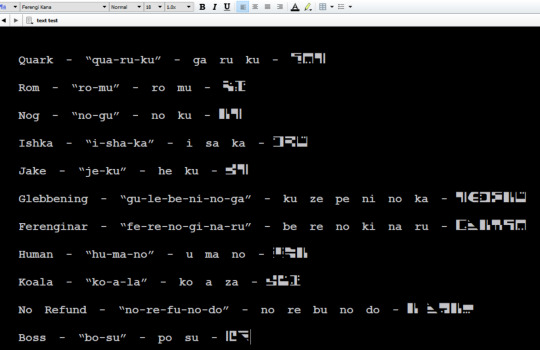
And here's the full mapping of phonemes to kana. You can see where I had to make some allowances. It's possible there's a different writing system that fits better, or a better way to map onto katakana, but this is as well as I can do with my "occasionally fucks around on duolingo" level of expertise, lol.
assigned phonemes: mapped kana:
a/ha a ア
i/hi i イ
u/hu u ウ
e/he e エ
o/ho o オ
ka/ga ka カ
ki/gi ki キ
ku/gu ku ク gu グ
ke/ge ke ケ
ko/go ko コ
sa/za/sha sa サ
si/zi/shi shi シ
su/zu/shu su ス
se/ze/she se セ
so/zo/sho so ソ
ta/da/tha ta タ da ダ
ti/di/thi hi ヒ
te/de/the te テ
tu/du/thu tsu ツ
to/do/tho to ト
na na ナ
ni ni ニ
ne ne ネ
nu nu ヌ
no no ノ n n
ma ma マ
mi mi ミ
me me メ
mu mu ム
mo mo モ
ya ya ヤ
ye yu ユ
yo yo ヨ
ra ra ラ
ri ri リ
re re レ
ru ru ル
ro ro ロ
wa wa ワ
wi do ド
we de デ
wo wo ヲ
pa/ba pa パ
pi/bi pi ピ
pe/be pe ペ
pu/bu pu プ
po/bo po ポ
fa/va ba バ
fi/vi bi ビ
fe/ve be ベ
fu/vu bu ブ
fo/vo bo ボ
cha/ja ha ハ
chi/ji chi チ
che/je he ヘ
chu/ju fu/hu フ
cho/jo ho ホ
la za ザ
li ji ジ
le ze ゼ
lu zu ズ
lo zo ゾ
qua/gwa ga ガ
qui/gwi gi ギ
que/gwe ge ゲ
quo/gwo go ゴ
#star trek#ds9#ferengi#free fonts#feel free to clone the font and make tweaks or different graphics or whatever#i just used the default brick set i didn't draw vector art or anything fancy#yes im avoiding working on other things how did you guess#all 5 people who might want this come get y'all food
108 notes
·
View notes
Text
meringues - translated comics (a - m)

artist names beginning with n - z: here
💝 = all l 💍 = charlie l 🦊 = sariel l 🍭 = jesse
🏎 = osborn l 👔 = evan l ✨ = npc

a pei ge / 啊呸咯
💍 happy puppy
💍 meme
💍 witch
-
cheng zhang kuai le pai gai gai / 成长快乐牌钙钙
💝 valentine’s day
💝 168 hours of love
-
dai shang suan tou ya / 带上蒜头鸭
💍 when your bikini falls off
-
di gua er miao y / 地瓜儿苗y
💍 cake charlie
-
east_lan
👔 young evan
-
·evannnn·
💍 memes
-
fang pi xiao gou / 放屁小狗
💍 kiss
💍 sweeter
💍 she’s taken
💍 fever
💍 hug
💍 impressions
💍 angel
💍 puppy’s love diary
💍 birthday
💍 merry christmas
💍 uncle ji
-
hotaru咕咕咕
💍 firefighter
💍 night
💍 birthday
💍 balloons
💍 tiny puppy
💍 crybaby
💍 truth or dare
💍 drunk
💍 valentine’s gift
💍 cake and cherry jam
💍 tiny charlie
💍 warm
💍 three days
💍 kissing a little bird after work
💍 mini
💍 dazzling
💍 little puppy
💍 little angel
💍 a thief of hearts
💍 feathers
💍 resplendent sweet time
💍 when he receives a text from his fiancée
💍 i like you
-
hua le ge xin / 婳了个馨💛
✨ yan yan
✨ the “breathing in zhou yan” treatment
✨ university au
✨ shy puppy
✨ halloween
✨ yan yan is scared to sleep alone
-
huo xing tang sha die niu rou gan / 火星糖_沙嗲牛肉干
💍 king of the birds
💍 baidu maps
💍 nothing’s perfect?
💍 after saving charlie from drowning
-
jian zhu / -箭竹-
💍 influence
🍭 childhood friend
-
jiang yan ting / 江烟汀
💍 a direct approach
💍 affectionate
-
jie mu ye / 结木耶
💝 fashion
-
jin ye bu zhai yue / 今夜不摘月
💍 luck
💍 the reason why an an felt a chill down her spine
💍 headband
💍 puppy zha
💍 steering wheel
💍 chirp chirp
-
li hao de da xiu zi / 黎昊的大袖子
💍 recharge
💍 new house
💍 coffee encounter
💍 a suitable outfit
💍 photo
💍 throne
-
liu sang / 流桑
💍 from next door
-
lu ming shi / 錄名師
💍 the deep trenches
💍 drunk
💍 kiss
💍 “group” photo
💍 matching outfits
💍 when he turns into a child
💍 are you cold?
💍 daily cuteness
💍 fishing
💍 game vs reality
💍 chapter 10
💍 another day of liking charlie
💍 95th day of liking charlie
💍 96th day of liking charlie
💍 97th day of liking charlie
💍 98th day of liking charlie
💍 99th day of liking charlie
💍 100th day of liking charlie
💍 🥺
💍 101st day of liking charlie
💍 when you’re offline
💍 102nd day of liking charlie
💍 104th day of liking charlie
💍 107th day of liking charlie
💍 108th day of liking charlie
💍 113th day of liking charlie
💍 the demon king
💍 the monster
💍 ancient outfit
💍 attracted to a new character?
💍 guilty
💍 falling off a chair
💍 are you looking at me?
💍 wings
💍 his thoughts
💍 sherry
💍 miss you
💍 kiss
💍 firefighter
💍 fireworks
💍 gravity
💍 pants
💍 valentine’s day
💍 painting
💍 hairstyle
💍 if
-
lǜ zhì / 绿雉
💍 every christmas
💍 new outfit
💍 young master
💍 heartache
🦊 hug
🦊 tuft
-
ma ke fu si ji / 麻可夫斯基
💝 chests
💝 the mirror of erised
💝 the time i turned into a male lead with a harem
💍 goose
💍 skilled
💍 a bitten palm
💍 staying up late
💍 the short-haired firefighter
💍 true nature
💍 degrees of jealousy
💍 supper
💍 kiss
💍 truth or dare 5
💍 courage
💍 under the lectern (nsfw)
💍 serious dr zha
-
man bo tu / 曼波兎
💍 happy new year
💍 boy or girl?
💍 night
💍 meeting the parents
💍 dr zha’s anticipation
💍 guide to taking care of a goose charlie
💍 chance encounter ch 2
💍 caught a cold
💍 always loving his fiancée
💍 parenthood
💍 blossoms
💍 a series of unhappy charlies
💍 robot vacuum
25 notes
·
View notes
Photo
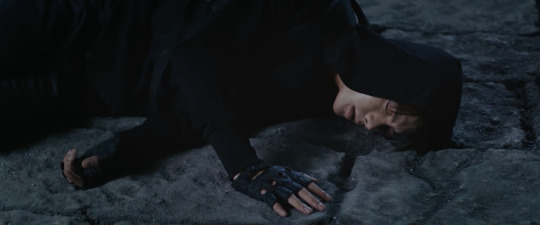
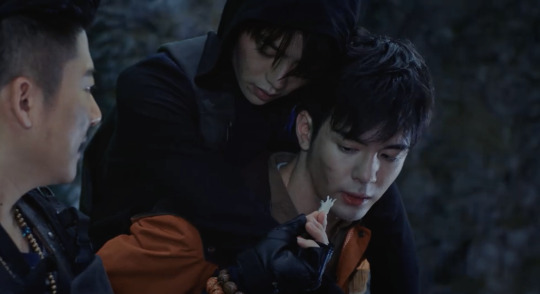
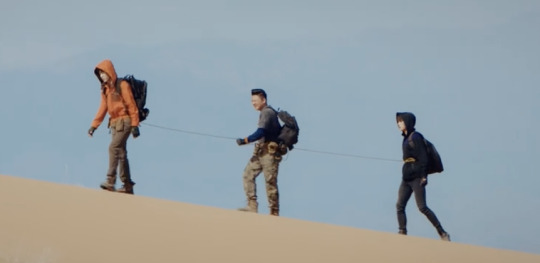
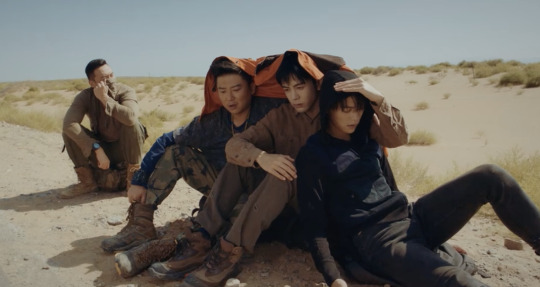
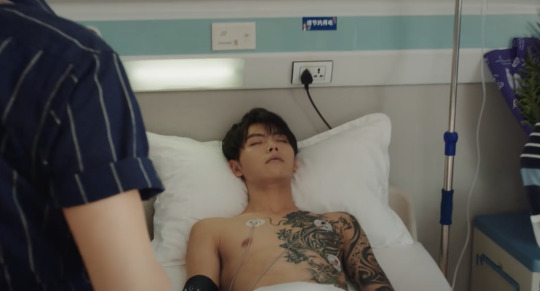
On 8/17/2021, Zhang Qiling has now returned to Wu Xie and Pang Zi for 6 years.
Because I can’t visit Chang Bai Shan or Hang Zhou or Xi Zang or anywhere tbh 😭 for my first ever 817, I’m visiting Tumblr instead to post my rare thoughts. I wanted to dedicate my 817 post to these pictures from Episode 16 of Ultimate Note.
Let me explain why *hem hem*. The first two pictures are when Zhang Qiling exited the yun yu in Xi Wang Mu's cave palace and lost his memory. Clearly, he's in a disastrous physical state or else someone as fit and martially skilled as him would never lay in such a vulnerable position or have to be carried.
In the third picture in the desert though, he's walking by himself. We know Wu Xie and Pang Zi would have carried him without any hesitation (I mean even Hei Yanjing and Xiao Hua carried (dragged) Tuoba out of the desert), so Xiao Ge must have been determined to walk by himself.
And we also know from the last two pictures that he wasn't walking because he was fully recovered. The moment they exit the desert and reach safety, Xiao Ge is in a feverish coma state again and stays that way until after spending many days in the hospital. So he really was walking by himself in the desert not because he felt that much physically better but because he didn't want to "burden" Wu Xie or Pang Zi and have them spend their energy on carrying him.
These scenes may just be a few minutes in a 36 episode long tv series or 10+ year fandom or thousands years long story, but they embody why Dao Mu Bi Ji and Tie San Jiao enchant me so much. I’ll never encounter zombies or raid a tomb or fight a powerful secret organization, but it’s so believable to me that the characters of dmbj exist somewhere. Somewhere there’s a Wu Xie stringing together the coin bracelet of a woman who wanted to kill him or setting out to rescue an uncle who has lied to him in every imaginable way. Somewhere there’s a Pang Zi holding the lifeless body of his beloved in his lap or making a nametag so his good bro can find his way home. Somewhere there’s a Zhang Qiling who’s willingly harsh to himself if it means his friends’ lives are a little easier.
Through the eyes of the live comment generator that is Wu Xie, I’ve been immersed into the spectacular world Nanpai Sanshu has created. Reading for pure fun is not something I do often, but the dmbj series made me want to read every single word with all my heart - if not for the plot, then just to make sure Wu Xie still has a tian zhen (innocent and naive) side, that Pang Zi is still lively at times, that Zhang Qiling returns from the too cold Chang Bai Shan, and to follow everyone else to the end of their written stories.
Ending with this line that perfectly describes the magical connection between a book and its readers: 两方世界山河共,一纸内外烟火同.
#ultimate note#zhong ji bi ji#dao mu bi ji#the lost tomb#zhang qiling#men you ping#poker face#xiao ge#little brother#tie san jiao#iron triangle#wu xie#ping xie#pang zi#ping pang#daomi festival#character meta#character analysis#shijiegongzi
33 notes
·
View notes
Text
Prince of Tennis (2019) Characters
This list was made based on the Chinese and Japanese Wikipedia entries for Prince of Tennis (2019), and the Dramawiki for the names of most of the actors. Please let me know if you spot any mistakes/ have any more to add!
Legend: [CHN Character name] [Name in Chinese characters] (Actor): Original JPN Name
Names with readings I'm not sure of are in italics
Yu Qing 育青 / Seishun Academy
Lu Xia 路夏 (Peng Yu Chang): Echizen Ryoma
Mu Siyang 穆司陽 (Xie Bin Bin): Tezuka Kunimitsu
Qiao Chen 喬晨 (Dong Li): Momoshiro Takeshi
Chi Dayong 池大勇 (Zhu Zhi Ling): Oishi Shuichiro
Zhuo Zhi 卓治 (Zhang Yi Jie): Fuji Syusuke
Tang Jiale 唐佳樂 (Xu Ke): Kikumaru Eiji
Yan Zhiming 嚴智明 (Li He): Inui Sadaharu
He Xinglong 賀興隆 (Fan Lin Feng): Kawamura Takashi
Zhang Baiyang 張百揚 (Wu Xu Dong): Kaidoh Kaoru
Qi Ying 齐瑛 (Song Yi Ren): Ryuzaki Sakuno
Peng Shang 彭湘 (Lu Jia): Osakada Tomoka
Huang Jing 黃靖 (Yu Kai Ning): Combination of Arai, Sasabe, etal
Ma Xiuwen 馬修文 (Zhang Ke Yuan)
A Mu 阿穆 (Li Jun Zheng)
Qi Na 齐娜 (He Jia Yi): Ryuzaki Sumire
Lu Xiangqian 路向前 (Wu Qi Jiang): Echizen Nanjiroh
Hao Dahe 郝大河 (Jin Yu Bo): Yamato Yudai
Yu Hang 育航 / Gyokurin
Bu Zhongchuan 钟歩川 (Jin Hao Chen): Fukawa Kimiyoshi
Wu Quan 吴泉 (Zhang Hang [YOUNG-G]): Izumi Tomoya
Yu Feng 玉峰 / Fudoumine:
Xu Ziping 徐子平 (Chen Shang Ze): Tachibana Kippei
Yan Jiang 燕江 (Wang Yong Feng): Sakurai Masaya
Shi Tienan 旋铁男 (Yang Chen Yi): Ishida Tetsu
Sima Yiwu 司马亦武 (Kong Chui Nan): Ibu Shinji
Shen Weiming 申伟明 (Liu Cheng Lin): Kamio Akira
Chen Desen 陈德森 (Gu Yu): Mori Tatsunori
Wei Kefei 韦克飞 (Ming Peng): Uchimura Kyosuke
Xu Xingzi 徐杏子 (Sun Jia Yu): Tachibana An
Xing Yao 星耀 / Hyotei Academy
Ji Jingwu 纪景梧 (Ren Yan Kai): Atobe Keigo
Hua Chonghong 华崇宏 (Yu An): Kabaji Munehiro
Hu Liangliang 胡亮亮 (Yang Ze): Shishido Ryo
Song Ci 宋慈 (Shi Zi Xun): Akutagawa Jiroh
You Shixing 游世星 (Fan Xiao Dong): Oshitari Yuushi
Yue Yang 岳阳 (Gao Xin): Mukahi Gakuto
Ji Nuo 吉诺 (Jiang Xin Qi): Hiyoshi Wakashi
Feng Zhiyuan 冯志远 (Jin Zhong Xi): Ootori Choutaro
Coach Fu 付教錬 (Tian Jia Da): Sakaki Tarou
No. 3 (Shisan) High School 市三 / Yamabuki
Ya Jiuxin 亚久辛 (Wang Yan Yang): Akutsu Jin
Shen Qianshi 沈千石 (Lou Ming): Sengoku Kiyosumi
Nan Jianzhi 南建知 (Liu Yu Feng): Minami Kentarou
Tan Yitai 谭一泰 (Huang Xing Yuan): Dan Taichi
Fang Yadong 方亚东 (Peng Gang): Higashikata Masami
Ma Lintao 马林涛 (Zhang Yuan Kun): Muramachi Tohji
Coach Tian 田教練 (Hong Wei): Banda Mikiya
Chen Huijing 陳慧敬 (Yang Cai Ying): Akutsu Sayuri
Guo Zi 國子 / St. Rudolph
Zhuo Yu 卓宇 (Zhao Zi Qi): Fuji Yuuta
Guan Yue 关岳 (Lan Bo): Mizuki Hajime
Qiao Ze 乔泽 (Liu Ming Kai): Akazawa Yoshiro
Ling Tian 梁田 (Jerry Chang): Kaneda Ichiro
Liu Zecheng 刘泽成 (Tang Xiang En): Yanagisawa Shinya
Qin Yifei 秦一婓 (Deng Zhi Yuan): Kisarazu Atsushi
No. 6 (Di Liu) 第六 / Rokkaku
Kui Jian 奎建 (Lei Ming): Aoi Kentaro
Yu Zifeng 余子风 (Fu Yan Zhang): Kurobane Harukaze
Lin Xiyan 林希彦 (Yao Jun Zhe): Itsuki Marehiko
Tian Ye 田野 (Wang Hao Yu): Amane Hikaru
Zuo Xiaohu 左小虎 (Li Zheng Jun): Saeki Kojiro
Mu Jinliang 穆金亮 (Zhai Xu): Kisarazu Ryo
Liu Muyun/Mr. Six 劉牧雲/六爷 (Hou Tong Jiang): Oji
Hai Guang 海广 / Rikkaidai
Bai Shiting 白市廷 (Ren Yun Jie): Yukimura Seiichi
Tian Zilong 田子龙 (Xiang Yun Long): Sanada Genichiro
Ke Jie 柯杰 (Tan Xu): Jackal Kuwahara
Liu Lian 柳濂 (Wang Yi Bo): Yanagi Renji
Jin Wentai 金文太 (Cao Jun Xiang): Marui Bunta
Yuan Chi 袁驰 (Shen Qi): Kirihara Akaya
Wang Yaren 王雅人 (Xu Rui Lin): Nioh Masaharu
Lu Sheng 吕胜 (Li Shu Ren): Yagyuu Hiroshi
Ying Cai 英才 / Ginka
Xiang Jingtian 向静天 (Chen Peng Wan Li): Fukushi Michiru
Chen Dahai 陈大海 (Ma Wenchao)
Lin Ye 林叶 (An Zi Yang)
Other Characters
Sha Sha 沙莎 (Liu Yong Xi): Shiba Saori
Li Na 李娜 (Li Na) [Bookstore owner]
Jiang 姜 (Jiang Shang): Tatsugoro [Racquet repair man]
*(2020.03.11) Fixed typo on Bai Shiting's actor name. Thanks to @tsunaminh for pointing it out!
*(2020.03.16) Fixed Ji Nuo's name! Thanks to @rlkkai for pointing it out!
*(2020.04.08) Fixed typo in Lu Xiangqian's name
#prince of tennis#prince of tennis 2019#match! tennis juniors#chinapuri 2019#fen dou ba shao nian#chinese prince of tennis
94 notes
·
View notes
Text
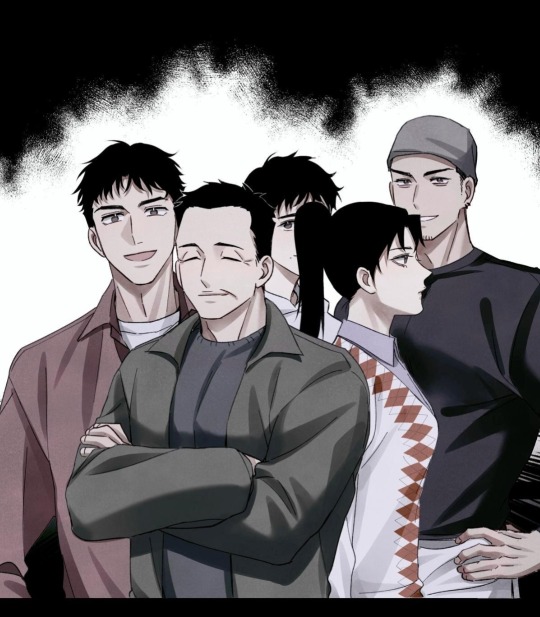
“Global Examination” by Mu Su Li. Manhua is from Bilibili; English translation is available for free - read it here!
1 note
·
View note
Text
Read: Let Go of that Shou by Fei Tian Ye Xiang
So in between Yingnu (which I love) and Joyful Reunion (which I love) there was one more book in FTYX's "Constellations" series called "Let Go of that Shou". I never got past the first 10 pages or so because it's ... odd, huge departure in mood from Yingnu odd. With FTYX serialising the 4th book in the series I thought I'd go back and finish it.
I finished it. That was not what I expected (⊙_⊙)
What I expected: pwp danmei NP (1 shou 6 gong) wuxia/xianxia adventure HE ending in 1v1
What I got: pwp danmei NP (1 shou 6 gong) wuxia/xianxia adventure HE and one of the gongs turns out to be the shou's dad 1v1
Details under cut.
WARNINGS: MC does end up with his dad as a romantic partner full stop. Also, while most of the sex scenes in this book happens because MC initiated things, there is one extended rape scene (with someone other than ending ML), and some of the sex initiated by MC is fuck or the other guy dies, which from the pov of the other party is totally dubcon at best, so now's your chance to nope out. Okay? Okay.
Summary: the young successor to the demon cult You Mengzhe has only ever trained in couple cultivation ever, and doesn't know any other martial arts. He runs away from home and tries to sleep with everyone he runs into (but only those who can fight, since that's how he gains any powers), and in the process it's basically mamma mia --- he finds out his dad(You Gutian)'s not really his dad, and then people keep claiming to be his dad until he's awfully confused. Takes place ~450 years after Yingnu.
But what this book feels like is ... is FTYX's own fanfic where he gets to write all the sex scenes with all the characters who didn't get much/any sex scenes before. There's not much character development since the story takes place over months, but there is a surprising amount of plot.
MC reminds me a lot of You Miao from To Rule in a Turbulent World / 亂世為王, but it's the You Miao from the first half of the first book. But in a departure from smart MC/ loyal pup ML that FTYX tend to favour, the MC ML here is more like dumb and dumber.
here's your six gongs in order of sex scenes (slightly spoilery):
Sun Bin: A master thief. About MC's age and even more immature, first love archetype
Yu Changqing: If you've read Yingnu, he's instantly recognisable as a stand-in for Fang Qingyu. Older brother archetype. Fang Qingyu has always wanted to be an upright gentleman, so this time he gets to be one. ;-;
Yuwen Hong: MC's shadow guard who's been protecting him secretly since MC was born. Very protective and kind of a copy of Li Zhifeng from To Rule in a Turbulent World. Innocent and straightforward and loyal (no principles, MC says jump off a cliff he'd jump off a cliff) puppy archetype.
Zhao Feihong: MC's mother's ex. Older uncle archetype, is basically Han Canghai from Yingnu? Ends up a general but not very good at it, which makes me think he must be Zhao Kui (Joyful Reunion)'s ancestor.
Zhang Yuanshan: A distant relative of Zhang Mu from Yingnu. He's mute, communicates by sign language, and he's PERFECT --- he's stylish, polite, good at martial arts, has integrity, protective, loves You Mengzhe like a son at first sight and spoils him in all the fatherly ways. My personal favourite. I wish he'd have turned out being real dad and the rest of the story remain as is ...
You Gutian: The leader of the demon cult, not actually MC's dad but MC doesn't know that (although it is very obvs to the audience). Your quiet and mysterious villain archetype.
Do I recommend this: It does avoid one of the serious pitfalls of NP文 in that You Mengzhe is not irresistible. Half the Gongs aren't even romantically/sexually attracted to him. There is a bit of lore to be had --- such as that one half of the Li imperial family's jade arc actually ended up with the Xianbei royal family in the extra! This totally (sort of) explains why Lang Junxia chose to follow Li Jianhong when he was something like 15 years old and why Li Jianhong has both halves of the jade arc.
/new ship crack ship ... orz
Ultimately I was only here hoping for more Zhang Mu and Fang Qingyu, and in a way I got more Zhang Mu (Zhang Yuanshan) and Fang Qinyu (Yu Changqing), they both lived to see the end of the book with all their limbs and fingers intact, so I can't complain. The sex scenes are ... okay. If you want smut go read Po Guan Zi Po Shuai or To Rule in a Turbulent World.
I would not read this again. Ok maybe just the bits with Yu Changqing or Zhang Yuanshan in it ...
4 notes
·
View notes
Text
Review: Ashes of Love
I’ve watched this show twice and that still doesn’t stop the emotions from getting out. Despite having a rather large fanbase, I really think this show is underrated.

Plot:
The Flower Deity dies after giving birth to a daughter, Jin Mi. She has a premonition that her daughter will suffer a great love trial, thus before dying, she gives her a magical pill that prevents her from feeling and expressing romantic love. This causes Jin Mi to become the brunt of many jokes when she gets tangled in a love triangle with Fire Immortal Xufeng and the ambitious Night Immortal Runyu.
Cast & Characters:
Yang Zi (杨紫) as Jin Mi (锦觅)
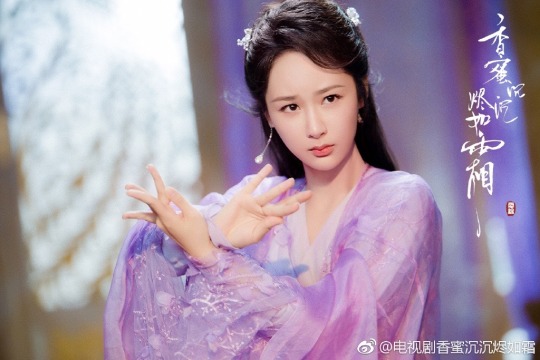
Deng Lun (邓伦) as Xu Feng (旭凤)

Luo Yunxi (罗云熙) as Run Yu (润玉)

Chen Yuqi (陈钰琪) as Liu Ying (鎏英)

Wang Yifei (王一菲) as Sui He (穗禾)

Zou Tingwei (邹廷威) as Mu Ci (暮辞)
My Thoughts:
Plot:
The show starts out very light and innocent, as does our protagonist Jin Mi. Everything moves at a rather fast pace, so the show is rarely ever boring. There are only two complaints I have for the plot: 1, Xu Feng and Jin Mi are only ever “together” in like five episodes, and we never get more than a few episodes of the two of them in love and happy without any obstacles; and 2, there were a lot of sub storylines. For example, Liu Ying and Mu Ci took up a lot of time, as did Run Yu and his mother. However, I would say the latter plot was actually very interesting, while the former kind of lagged on, since it always followed the same pattern. My favorite part was probably the human realm, that was so cute and a breath of fresh air from the many politics in the heavenly realm.
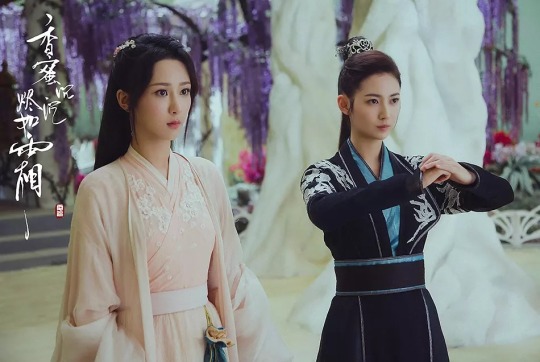
Acting:
I have very few complaints on this aspect of the show. Everybody acted really well, and really brought their characters to life. Yang Zi, particularly, did very good with Jin Mi. She was able to play the innocent and childish Jin Mi, and yet also persuade us of Jin Mi’s darker side, and her sorrow in loosing her father and Xu Feng. I would say her acting during the later episodes are even better than her acting earlier on, even though the human realm episodes were a highlight.
Deng Lun also did really good as Xu Feng, especially as the Demon Lord, when he was struggling to trust anybody, and didn’t know whether Jin Mi was being real about her confessions of love. His sorrow and hatred as the Demon Lord was brought out wonderfully. His love-rival, Luo Yunxi as Run Yu also did very good. Especially in the arc in which he found out about Su Li, and then lost her due to schemes by the Heavenly Empress.
Shoutout to Wang Yifei as Sui He. She did really good, and I honestly think people weren’t really acknowledging this since she’s supposed to be the like the “mega-villain”. Her acting during the Demon Realm wedding was very good, and you could just see the love disappear from her eyes when Xu Feng said he loved Jin Mi.
Obviously my fav Chen Yuqi did very good as Liu Ying, especially in the scene where Mu Ci died, that was pretty depressing and she brought out the type of sadness in which you almost don’t believe it. Zou Tingwei’s Mu Ci didn’t really get a lot of scenes, and I wasn’t particularly impressed by him. I also wasn’t that impressed by veteran actress Kathy Chow, since she always made the same expression as the Heavenly Empress. But I guess she did good enough since I really hated the role.

I also really have to applaud the chemistry between Yang Zi and Deng Lun. Man, those two really tugged at my heartstrings. Also, their real-life friendship and chemistry off-screen is so heartwarming!
Characters:
Alright, some of these characters I didn’t love so much. First off, Jin Mi could be really idiotic sometimes, like to a point where it didn’t even make sense. However, I do like how she is very kind (usually), and was willing to [spoiler] sacrifice herself for peace between the two realms.
Xu Feng was definitely one of the more likable characters, Deng Lun is really charismatic honestly and even though Xu Feng was kind of a boastful brat who was used to getting things his way in the beginning, you never got annoyed at him. Also his love for Jin Mi, which never quavers, really made his character. He really didn’t deserve all the things that happened to him...
I really liked badass Liu Ying too. Especially when she was willing to fight Xu Feng in one of the earlier episodes. Jin Mi is kind of weak, until she officially becomes an immortal, but Liu Ying is strong, and independent, she doesn’t need protection. I really liked that, and her straightforward attitude. Also her friendship with Xu Feng was nice, I’m glad she wasn’t one of those basic second leads. And even though Sui He was one of those basic second leads in ways, her undying love for Xu Feng was also a redeemable quality. Sure, she did a lot of bad things, but the Heavenly Empress was really just using Sui He as a puppet. Okay, that doesn’t make Sui He a good person, but she really didn’t deserve that ending. After all, sure she killed Jin Mi’s mother and father because of love and her devotion to the Heavenly Empress, but Jin Mi killed Xu Feng (the person who loved her the most in the entire six realms) because she wasn’t thinking.
A lot of people really loved Run Yu, but I’m not part of his fan club. He was so possessive over Jin Mi, to a point where it didn't matter of she was happy, it only mattered that she was with her. Sure, he had a sad backstory, and was always in isolation, but if Jin Mi doesn’t want to be with him, living a depressing life in a depressing place, he should not be forcing the person he “loves” to stay there.
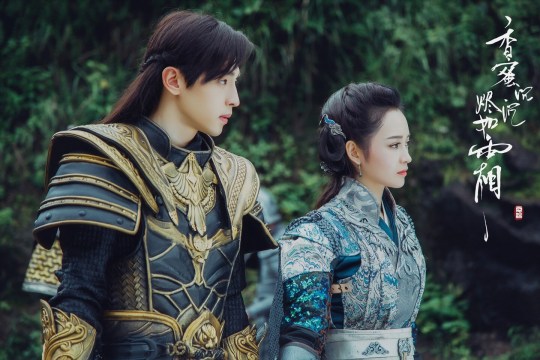
The OTP:
Oh yes! I love the OTP here, and I love how they actually end up together! As I said before, their chemistry is off the charts, and honestly while I wasn’t totally sold on the OTP in earlier episodes, by episode 10, I already hopped on the ship and was only hoping for the best. The two of them go through so much, and it’s good to see it finally pay off when they finally end up together.
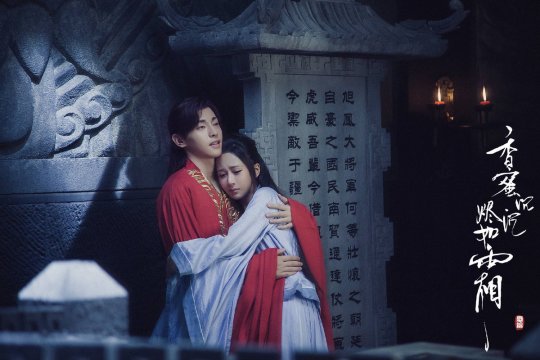
Their interactions during the human realm and the episodes following, as well as the demon realm were so CUTE!
Music: The music was also beautiful. One of the theme songs, called "Love Frost (情霜)" really fit the show so well. And Yang Zi sings it very good too.
Costumes: The costumes were simply sublime! It was to be expected, obviously, seeing as the show had a huge budget. Honestly, I feel like Sui He had some of the best dresses, even though they kind of made her look like a bird.
Cinematography: If you’re someone who really likes the natural scenes, this show might not look so appealing, since a good amount of it takes place on the Heavens, and in the Demon Realm.
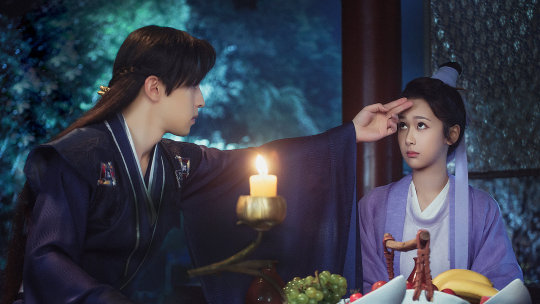
Overall Rating: A
Recommend For: People looking for a really well-done, well-acted, and well-written show and don’t mind some melodrama and tragedy here and there. (Honestly, everybody go watch it!) It’s one of the best idol dramas out there.
117 notes
·
View notes
Photo
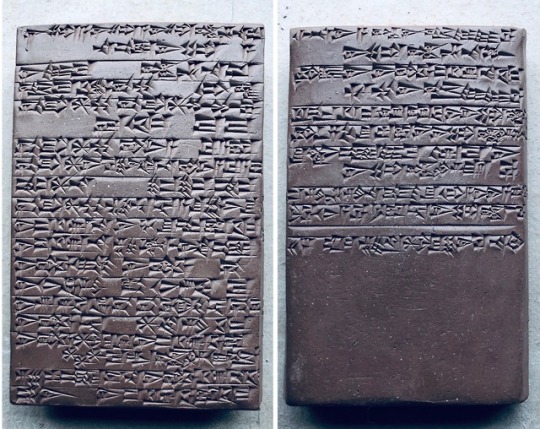
The Adornment of a Goddess with Scents: A Sumerian shirnamshuba song of the Goddess Ninisina
This is my rendition of a cultic song of Ninisina, the chief deity of the important Mesopotamian city of Isin, whose most prominent role in the larger Mesopotamian pantheon was that of a healing goddess, a role she shared with a number of other goddesses such as Gula, Nintinuga, and Bau. Her son Damu, a so-called “dying god” who was widely featured in Sumerian lamentations and was associated in this role with Dumuzi, frequently assists her in her curative procedures. A remarkable Sumerian letter of the Larsa king Sin-iddinam to Ninisina herself (one of a number examples of letters of humans to gods) survives to us where Sin-iddinam implores the goddess to cure a grave illness that cannot be diagnosed that a demon infected him with in a dream. She is also memorably depicted as a ferocious protector of king Shulgi’s enemies in a shirnamerima song, the so-called “Execration of Shulgi’s Enemies” or “Shulgi S,” where in one passage, she seems to use her knowledge as a physician to maximize harm to the enemy. Ninisina’s spouse was the warrior god Pabilsang, chief god of the city of Larak, one of the five original cities of Mesopotamia before the gods sent the great flood. Pabilsang is best known to posterity for his place in the nighttime sky as the constellation Sagittarius.
In this text, Ninisina is described as adorning her body with various oils and perfumes. In ancient Mesopotamia, the perfume industry was relatively advanced and utilized a number of aromatic trees and plants, many of which were exotic imports. Most famous was the eren tree, originally understood to grow in the eastern mountains, which was the prize sought by Gilgamesh in his heroic journey, leading to conflict with Huwawa, the guardian of the forest, who was imbued with paralyzing aurae. The song does not mention it explicitly, but the goddess was most likely applying scents over the whole of her naked body while beautifying herself for sex with her spouse (or possibly the mortal king, although there is more evidence for this practice with the goddess Inana). The application of perfumes is featured during the most detailed account of the so-called “sacred marriage ritual” between king Iddin-Dagan of Isin and the goddess Inana.
The lone ancient manuscript of this text currently known to us is an immaculately preserved manuscript in the Harvard Semitic Museum. Here is a picture (credit Havard Semitic Museum and the Cuneiform Digital Library Initiative):
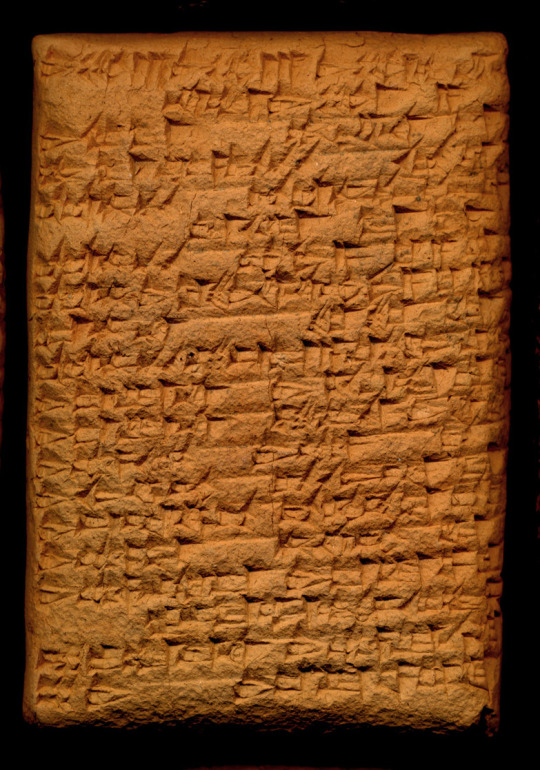
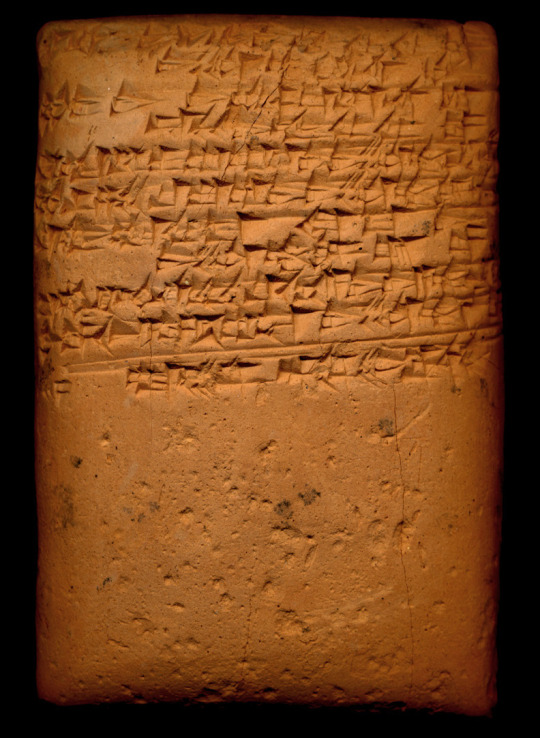
The text was first published in copy in the Journal of Cuneiform Studies in 1962. The original editor of this text, Mark Cohen (“The Incantation-Hymn: Incantation or Hymn?,” Journal of the American Oriental Society volume 95 (1975), pg. 601, see also the Electronic Text Corpus of Sumerian Literature (etcsl.orinst.ox.ac.uk), text number 4.22.2) suggested that this cultic song may have been performed while the statue of the goddess was naked in order to appease her anger.
The reading of this text in the original Sumerian and its translation is as follows. The character “š” is pronounced “sh” and the character “ĝ” is pronounced “ng” (a nasal “n”). The subscripted numbers are not pronounced, and the signs given in brackets ({...}) are not pronounced (they merely indicate what category the word belongs to). My translation differs substantially from the previous edition of this text (including several different sign readings and values). A backslash indicates where the line has been indented.
1. i3-li-a i3-li-a i3-li he2-en-na-tum2 /na-aĝ2-i3-li-a
2. i3 lum-ma he2-en-na-tum2
3. tum-ma sag9-ga-ĝu10 ul-la
4. ga-ša-an-ĝu10 ga-ša-an sir2-sir2-e /ama ugu ma-ma
5. ga-ša-an-ĝu10 kurun-a tuš-a-ra
6. Ga-ša-an-i3-si-in{ki}-na kurun-a tuš-a-ra
7. izi an-na mu2-mu2-de3
8. ga-ša-an-ĝu10 sim{mušen} -gin7 tu5-tu5-a
9. i3 {ĝeš}eren-na i3 ha-šu-ur2-ra-ka
10. i3 {ĝeš}eren-na nam-dim3-me-er ki aĝ2
11. i3 šim-gig i3 bulugx-ga
12. i3 ab2 kug-ge gara2 ab2-šilam-ma
13. i3-nun tur3 kug ga-ga amaš-gin7 ga-ga
14. i3 šim-gin7 an-šag4-ge-ka
15. i3 ligidba(ŠIM.{d}NIN.URTA) {ĝeš}eren babbar-ra-ka /mul-ma-al he2-em-mi-ib2-za
16. zi-pa-aĝ2-ĝa2-na i3 šim {ĝeš}eren-na-ka
17. gaba-ni i3 {ĝeš}eren babbar-ra-ka
(reverse)
18. igi-na i3-a he2-ni-ib2-lum-lum-e /i3-li he2-en-na-su3
19. gu-sa-ni i3 šim {ĝeš}eren-na-ka /hu-mu-ni-ib2-lum-lum-e
20. siki ur2 siki pa dub-dub-ba-ni i3-li he2-en-na-an-su3
21. gu2 bar za-gin3 šu gur-ra-ni i3-li he2-em-su3-su3
22. šu ĝir3 aĝ2-lum-ma-lam-ma-ni /i3-li he2-em-luh-e
23. ĝeš-ge-en-ge-na alan šu du7-a i3-a he2-en-nu2
24. nin ab2 a-e ĝar-ra-gin7 i3 he2-la2-e
(double ruling)
25. 24 šir3-nam-šub {d}Nin-isin2{si}-na-kam
<br />
1. Fine oil shall be fitting for her, it is the “state of (being covered in) fine oil”!<br />
2. Luxuriant oil shall be fitting for her!
3. My beautiful …, swollen (with attractiveness),
4. My lady, Lady Sirsir, birth mother …,
5. For my lady, who dwells among the liquor,
6. For Ninisina, who dwells among the liquor,
7. Fire is burning in the sky!
8. My lady, bathing like a swallow
9. Oil of juniper, oil of cypress
10. Oil of juniper, loved by divinity
11. Oil of the shimgig tree, oil of the bulug tree
12. Butter of the pure cow, cream of the cow
13. Ghee of the pure cattle pen, cream(?) as if (from) the sheepfold, cream
14. Like oil resin, it is of the midst of heaven
15. Oil of the euphorbia plant, oil of white juniper, may it splash (upon you)
16. On her throat, oil of juniper
17. On her chest, oil of white juniper
18. On her face may oil be made luxuriant! May fine oil be sprinkled upon her!
19. On the muscles of her neck, may oil of juniper be made luxuriant!
20. On her hair, styled from base to tip, may fine oil be sprinkled upon her!
21. On the nape of her neck, ringed with lapis, may fine oil be sprinkled upon her!
22. May fine oil cleanse her hands and feet, that which flourish and thrive(?)
23. May her perfect limbs and form lie in oil!
24. May the woman, like a cow placed in the water, be immersed in oil!
subscript: 24 lines: it is a shirnamshub song of Ninisina.
line 1) The very beginning of the song is pronounced “ili’a ili’a ili.” Such a replication of the “l” noise, called “ululation,” is frequently employed at the beginning of Sumerian cultic songs.
line 3) “tum” is primarily a value used to spell Akkadian words, the meaning of Sumerian tum here is obscure. The spelling tum-ma is possibly an error for ib2-ba “hips,” which in this context would have a highly sexualized connotation, in the possession of the would-be lover.
line 4) Possibly reflecting the Etarsirsir temple in the city of Girsu, which was a temple of the goddess Bau, who is associated with Ninisina as a healing goddess during this period. ma-ma possibly reflects the Emesal form of the verb ĝar “to set, put, establish” or the divine name Mama. Mama was a birth goddess: if correct, the reference here is unclear, but may have a sexual connotation.
line 5) Presumably this describes the goddess’s participation in a banquet.
line 9) Sumerian eren is often translated as “cedar” based on the association of the tree with the Lebanese cedar arising primarily from the Akkadian Gilgamesh Epic. However, in the Old Babylonian period this is probably an anachronism: the eren tree grows in the mountains east of Mesopotamia.
line 10) Elsewhere the eren tree is also described as the “flesh of divinity.”
line 13) The interpretation of Sumerian ga-ga here is uncertain: it may be the Emesal form of the verb “to bring” or another dairy product. The cattle pen and sheepfold (Sumerian tur3 and amaš) were often invoked in description of the dairy industry and its productivity.
line 20) Sumerian siki ur2 was understood by Cohen as pubic hair, but in conjunction with siki pa it is describing the hair of the head from the base to the tip of the hair follicle (for the meaning, see Couto Ferreira Etnoanatomia y partonomia del cuerpo humano en sumerio y acadio (2009), pg. 108). The verb dub/dab6 may be more technically describing a specific hairstyle worn by young women, embodied by the goddess Inana, as discussed by Mirelman and Sallaberger, Zeitschrift fur Assyriologie 100 pg. 83.
458 notes
·
View notes